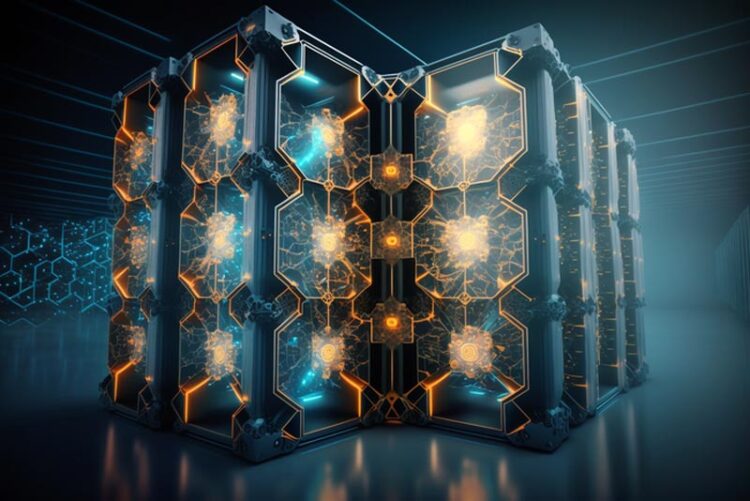New AI model transforms understanding of metal-organic frameworks

A computer server transformed by MOFs
Credit: Kevin Jablonka (EPFL)
Creative Commons CC BY-SA 4.0 license
How does an iPhone predict the next word you’re going to type in your messages? The technology behind this, and also at the core of many AI applications, is called a transformer; a deep-learning algorithm that detects patterns in datasets.
Now, researchers at EPFL and KAIST have created a transformer for Metal-Organic Frameworks (MOFs), a class of porous crystalline materials. By combining organic linkers with metal nodes, chemists can synthesize millions of different materials with potential applications in energy storage and gas separation.
The “MOFtransformer” is designed to be the ChatGPT for researchers that study MOFs. It’s architecture is based on an AI called Google Brain that can process natural language and forms the core of popular language models such as GPT-3, the predecessor to ChatGPT. The central idea behind these models is that they are pre-trained on a large amount of text, so when we start typing on an iPhone, for example, models like this “know” and autocomplete the most likely next word.
“We wanted to explore this idea for MOFs, but instead of giving a word suggestion, we wanted to have it suggest a property,” says Professor Berend Smit, who led the EPFL side of the project. “We pre-trained the MOFTransformer with a million hypothetical MOFs to learn their essential characteristics, which we represented as a sentence. The model was then trained to complete these sentences to give the MOF’s correct characteristics.”
The researchers then fine-tuned the MOFTransformer for tasks related to hydrogen storage, such as the storage capacity of hydrogen, its diffusion coefficient, and the band gap of the MOF (an “energy barrier” that determines how easily electrons can move through a material).
The approach showed that the MOFTransformer could get results using far fewer data compared to conventional machine-learning methods, which require much more data. “Because of the pre-training, the MOFTtransformer knows already many of the general properties of MOFs; and because of this knowledge, we need less data to train for another property,” says Smit. Moreover, the same model could be used for all properties, while in conventional machine learning, a separate model must be developed for each application.
The MOFTransformer is a game-changer for the study of MOFs, providing faster results with less data and a more comprehensive understanding of the material. The researchers hope that the MOFTransformer will pave the way for the development of new MOFs with improved properties for hydrogen storage and other applications.
Reference
Yeonghun Kang, Hyunsoo Park, Berend Smit, Jihan Kim. MOFTransformer: A multi-modal pre-training transformer for universal transfer learning in metal-organic frameworks. Nature Machine Intelligence 13 March 2023. DOI: 10.1038/s42256-023-00628-2
Media Contact
All latest news from the category: Information Technology
Here you can find a summary of innovations in the fields of information and data processing and up-to-date developments on IT equipment and hardware.
This area covers topics such as IT services, IT architectures, IT management and telecommunications.
Newest articles
Faster, more energy-efficient way to manufacture an industrially important chemical
Zirconium combined with silicon nitride enhances the conversion of propane — present in natural gas — needed to create in-demand plastic, polypropylene. Polypropylene is a common type of plastic found…

Energy planning in Ghana as a role model for the world
Improving the resilience of energy systems in the Global South. What criteria should we use to better plan for resilient energy systems? How do socio-economic, technical and climate change related…

Artificial blood vessels could improve heart bypass outcomes
Artificial blood vessels could improve heart bypass outcomes. 3D-printed blood vessels, which closely mimic the properties of human veins, could transform the treatment of cardiovascular diseases. Strong, flexible, gel-like tubes…





















